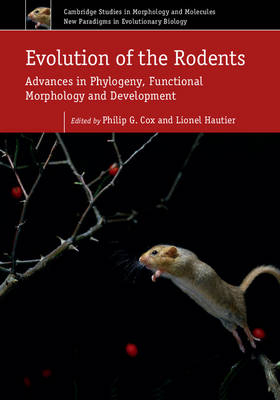
Evolution of the Rodents: Volume 5
Cambridge University Press (Verlag)
978-1-107-04433-3 (ISBN)
The widespread use of mouse models in developmental, behavioural and genetic studies has sparked wider interest in rodent biology as a whole. This book brings together the latest research on rodents to better understand the evolution of both living and extinct members of this fascinating group. Topics analysed include the role of molecular techniques in the determination of robust phylogenetic frameworks; how geometric morphometric methods help quantify and analyse variation in shape; and the role of developmental biology in elucidating the origins of skeletal elements and the teeth. The editors unite these disciplines to present the current state of knowledge in rodent biology, whilst setting the landscape for future research. This book highlights interdisciplinary links across palaeontology, developmental biology, functional morphology, phylogenetics and biomechanics, making it a valuable resource for evolutionary biologists in all fields.
Philip G. Cox is a lecturer at the Department of Archaeology, University of York and the Hull York Medical School, and a researcher into the functional morphology of and evolution of mammals, particularly rodents. Much of his research has involved the application of sophisticated engineering techniques, namely finite element analysis, to rodent skulls and mandibles in order to understand the biomechanics of feeding in these species. Lionel Hautier is a researcher (CR2) at the National Center for Scientific Research (CNRS) posted at the Institute of Evolutionary Sciences in Montpellier (ISEM). He is a vertebrate palaeontologist, specialising in mammals and notably rodents. His research interests include the evolution of the masticatory apparatus of extinct and extant rodents, studied using morphological (osteological and myological), morphometrical, and palaeontological evidence.
List of contributors; Foreword Jean-Louis Hartenberger and W. Patrick Luckett; 1. Rodentia: a model order? Lionel Hautier and Philip G. Cox; 2. A synopsis of rodent molecular phylogenetics, systematics and biogeography Pierre-Henri Fabre, Lionel Hautier and Emmanuel J. P. Douzery; 3. Emerging perspectives on some Paleocene sciurognaths rodents in Laurasia: the fossil record and its interpretation Mary R. Dawson; 4. Phylogeny and evolutionary history of hystricognathous rodents from the Old World during the Tertiary: new insights into the emergence of modern 'phiomorph' families Franck Barbière and Laurent Marivaux; 5. The history of South American octodontoid rodents and its contribution to evolutionary generalisations Diego H. Verzi, Cecilia C. Morgan and A. Itatí Olivares; 6. History, taxonomy and palaeobiology of the giant fossil rodents (Hystricognathi, Dinomyidae) Andrés Rinderknecht and R. Ernesto Blanco; 7. Advances in integrative taxonomy and the evolution of African murid rodents: how morphological trees hide the molecular forest Christiane Denys and Alisa Winkler; 8. Themes and variation in sciurid evolution V. Louise Roth and John M. Mercer; 9. Marmot evolution and global change in the last 10 million years P. David Polly, Andrea Cardini, Edward B. Davis and Scott Steppan; 10. Grades and clades among rodents: the promise of geometric morphometrics Lionel Hautier, Philip G. Cox and Renaud Lebrun; 11. Biogeographic variations in wood mice: testing for the role of morphological variation as a line of least resistance to evolution Sabrina Renaud, Jean-Pierre Quére and Johan R. Michaux; 12. The oral apparatus of rodents: variations on the theme of a gnawing machine Robert E. Druzinsky; 13. The muscles of mastication in rodents and the function of the medial pterygoid Philip G. Cox and Nathan Jeffery; 14. Functional morphology of rodent middle ears Matthew J. Mason; 15. Variations and anomalies in rodent teeth and their importance for testing developmental models Cyril Charles and Laurent Viriot; 16. The great variety of dental structures and dynamics in rodents: new insights into their ecological diversity Helder Gomes Rodrigues; 17. Convergent evolution of molar morphology in Muroidea (Rodentia, Mammalia): connections between chewing movements and crown morphology Vincent Lazzari, Franck Guy, Pierre-Emmanuel Salais, Adélaïde Euriat, Cyril Charles, Laurent Viriot, Paul Tafforeau and Jacques Michaux; 18. Developmental mechanisms in the evolution of phenotypic traits in rodent teeth Elodie Renvoisé and Sophie Montuire; 19. Diversity and evolution of femoral variation in Ctenohystrica Laura A. B. Wilson and Madeleine Geiger; 20. Morphological disparity of the postcranial skeleton in rodents and its implications for palaeobiological inferences: the case of the extinct Theriodomyidae (Rodentia, Mammalia) Monique Vianey-Liaud, Lionel Hautier and Laurent Marivaux; Index.
| Erscheint lt. Verlag | 6.8.2015 |
|---|---|
| Reihe/Serie | Cambridge Studies in Morphology and Molecules: New Paradigms in Evolutionary Bio |
| Zusatzinfo | 43 Tables, black and white; 18 Plates, color; 98 Halftones, unspecified; 26 Line drawings, unspecified |
| Verlagsort | Cambridge |
| Sprache | englisch |
| Maße | 182 x 254 mm |
| Gewicht | 1380 g |
| Themenwelt | Naturwissenschaften ► Biologie ► Evolution |
| Naturwissenschaften ► Biologie ► Zoologie | |
| Naturwissenschaften ► Geowissenschaften ► Mineralogie / Paläontologie | |
| ISBN-10 | 1-107-04433-2 / 1107044332 |
| ISBN-13 | 978-1-107-04433-3 / 9781107044333 |
| Zustand | Neuware |
| Haben Sie eine Frage zum Produkt? |
aus dem Bereich


